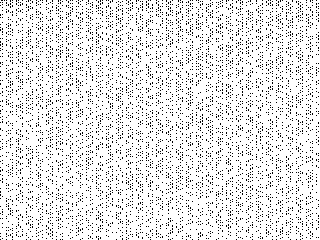Image:PrimeNumbersSmall.png
From Wikipedia, the free encyclopedia

No higher resolution available.
PrimeNumbersSmall.png (320 × 240 pixel, file size: 13 KB, MIME type: image/png)
Summary
Every pixel here represents a number in the range 1 to 76,800.
If the pixel is black, the number it represents is prime. If the pixel is white, that number is not prime.
So for example, the white pixel in the upper-left represents "1" which is not usually listed as prime. The next two black pixels to the right in the same row represent "2" and "3" which are prime.
For any pixel, the number it represents is given by
number = column + (row-1)*320 where column runs from 1 to 320, and row from 1 to 240.
See the list of the 100,008 primes, http://primes.utm.edu/lists/small/100000.txt
Licensing
I, the creator of this work, hereby grant the permission to copy, distribute and/or modify this document under the terms of the GNU Free Documentation License, Version 1.2 or any later version published by the Free Software Foundation; with no Invariant Sections, no Front-Cover Texts, and no Back-Cover Texts.
File history
Legend: (cur) = this is the current file, (del) = delete this old version, (rev) = revert to this old version.
Click on date to download the file or see the image uploaded on that date.
- (del) (cur) 05:28, 9 March 2007 . . JabberWok ( Talk | contribs) . . 320×240 (13,504 bytes) (Every pixel here represents a number in the range 1 to 76,800. If the pixel is black, the number it represents is prime. If the pixel is white, that number is not prime. So for example, the white pixel in the upper-left represents "1" which is not usua)
-
Edit this file using an external application
See the setup instructions for more information.
File links
Category: GFDL images
